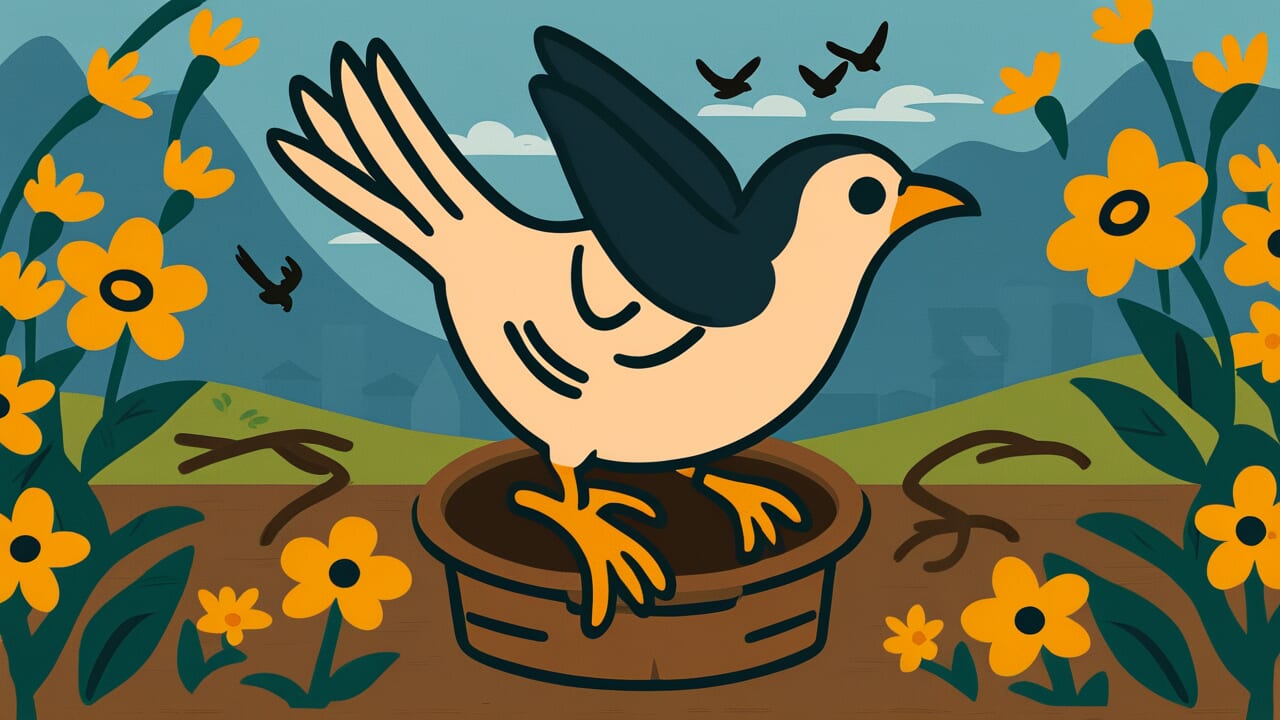How to Read “Flowers return to their roots, birds return to their old nests”
Hana wa ne ni kaeru, tori wa furusu ni kaeru
Meaning of “Flowers return to their roots, birds return to their old nests”
This proverb means that people eventually return to their hometown or birthplace. No matter how far they travel or how successful they become in the city, at major life milestones or in their later years, their hearts turn toward the place where they were born and raised.
This proverb is used when someone living away from home suddenly remembers their hometown or considers returning. It’s also used when people see someone who worked in the city for many years move back to their hometown after retirement.
Today, many people leave their hometowns for education or work. This proverb captures a fundamental human sense of belonging.
No matter where we live, deep in our hearts we carry feelings for our roots. These feelings grow stronger as we age.
Returning home isn’t a backward choice. It’s a natural part of being human.
Origin and Etymology
The exact literary origin of this proverb is unclear. However, its structure shows it comes from observing nature.
“Flowers return to their roots” describes a plant’s biological process. After flowers bloom, their nutrients return to the roots.
The nutrients drawn up from the roots to create flowers go back down after the petals fall. This prepares the plant for next year’s growth.
Japanese people have observed this natural cycle through farming since ancient times.
“Birds return to their old nests” refers to migratory birds returning to the same place each year. Swallows and storks, familiar to Japanese people, always come back to the same eaves or regions in spring.
This sight has touched people’s hearts throughout history. It has inspired many waka poems and haiku.
By combining these two natural phenomena, the proverb expresses the truth that humans also return home. It pairs plants and animals, stillness and movement.
By placing two different natural cycles side by side, it shows that returning home isn’t just human sentiment. It’s a universal law common throughout nature.
Usage Examples
- I worked in the city for 30 years, but flowers return to their roots, birds return to their old nests—I’ve decided to go back to my hometown after retirement
- I heard he ended up going back to his hometown too. Flowers return to their roots, birds return to their old nests—it’s really true
Universal Wisdom
The truth this proverb speaks to is the “instinct of belonging” carved deep in the human heart. We are social creatures who also seek our roots.
No matter how much of the world we see or how far we travel, somewhere in our hearts we need a “place to return to.”
Why do people want to return home? Because hometown isn’t just a geographical location. It’s the origin point where we became who we are.
The landscapes we saw as children, the dialect we heard, the air we felt, and most importantly, the people who accepted us unconditionally—these form the foundation of our personality.
They remain in the depths of our hearts no matter how much time passes.
Throughout life, we play various roles in various places. But in our hometown, we can shed those social roles and return to just being “ourselves.”
The longing for this “place where we can be our true selves” may grow stronger for those who carry many roles in modern society.
This proverb has been passed down through generations because humans remain beings who seek a “place to return to,” no matter how times change.
In our globalized era where we can live anywhere in the world, this truth may hold even deeper meaning.
When AI Hears This
All matter in the universe, left alone, scatters and becomes disordered. This is the second law of thermodynamics—the principle of increasing entropy.
But life does the opposite. After flowers fall, their nutrients gather at the roots to bloom again next year.
When birds return to old nests, experience and memory of place—information itself—concentrates at one point. This is behavior that deliberately returns scattered energy and information to their origin for reuse.
What’s important here is that life isn’t a closed system but an open one. Flowers take in solar energy from outside. Birds gain energy by eating food.
So while the universe’s overall entropy increases, locally order can be created. This is called a dissipative structure.
It’s the same principle as a typhoon absorbing ocean heat energy to create the order of a vortex.
What’s more interesting is that the act of returning itself proves efficiency. Compared to the cost of finding new places, returning to places that worked before has far better energy balance.
Salmon return to their birth rivers with over 90 percent accuracy. Even after traveling thousands of kilometers, returning remains the superior survival strategy.
Life doesn’t fight disorder—it cleverly uses it to maintain order.
Lessons for Today
This proverb teaches us the importance of valuing our roots. In our globalized age where we can live anywhere, knowing “where we came from” guides us in thinking about “where we’re going.”
If you live away from your hometown, remember it sometimes. Visit when you can. This isn’t a backward act—it’s precious time to reaffirm yourself.
Revisiting hometown landscapes and people helps you recover your “true self” that’s easily lost in daily busyness.
However, this proverb doesn’t force you to be bound by your hometown. What matters is having the security of knowing you have a place to return to.
That security is what lets people boldly venture into new worlds. Because roots are firm, flowers can bloom high.
Cherish the “place to return to” in your heart while you spread your wings freely.



Comments